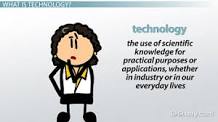Understanding Technology: What Does It Really Mean?
Technology is a term that we hear and use frequently in our daily lives, but have you ever stopped to think about what it truly means? In its simplest form, technology refers to the tools, machines, systems, and methods that are used to solve problems or achieve specific goals. However, the concept of technology goes far beyond just physical devices.
Technology encompasses a wide range of disciplines and fields, including engineering, computer science, information technology, and more. It is the driving force behind innovation and progress in virtually every aspect of our modern society. From the smartphones we use to communicate with others to the sophisticated medical equipment that saves lives, technology plays a crucial role in shaping our world.
One key aspect of technology is its ability to evolve and adapt over time. Advancements in technology have led to groundbreaking discoveries and revolutionary changes in how we live, work, and interact with one another. The rapid pace of technological development has transformed industries, created new opportunities for growth and collaboration, and improved the quality of life for many people around the globe.
Moreover, technology is not limited to just tangible objects or devices. It also includes intangible elements such as software, algorithms, networks, and data. The rise of digital technologies has ushered in a new era of connectivity and information sharing that has reshaped our world in profound ways.
Ultimately, when we talk about technology, we are referring to much more than just gadgets or gizmos. We are talking about the tools and systems that drive innovation, enable progress, and empower individuals and communities to achieve their goals. Technology is a dynamic force that continues to shape our present reality and hold immense potential for shaping our future.
So next time you hear the word “technology,” remember that it represents not just a collection of devices but a powerful force for change and advancement in our society.
Understanding Technology: 9 Key Insights into Its Role and Impact
- Technology refers to the application of scientific knowledge for practical purposes.
- It encompasses tools, machines, and systems used to solve problems or achieve goals.
- Digital technology includes computers, smartphones, and the internet.
- Emerging technologies like AI and robotics are transforming industries.
- Technology improves communication through devices like smartphones and social media platforms.
- It plays a crucial role in healthcare with advancements in medical equipment and telemedicine.
- Renewable energy technologies help address environmental challenges by reducing carbon emissions.
- In education, technology facilitates e-learning through online courses and digital resources.
- Technological innovation drives economic growth by creating new markets and job opportunities.
Technology refers to the application of scientific knowledge for practical purposes.
Technology refers to the application of scientific knowledge for practical purposes. It encompasses the tools, systems, and methods that harness scientific principles to solve problems, improve efficiency, and achieve specific goals. From simple machines to complex digital systems, technology plays a vital role in driving innovation and progress across various industries and aspects of our daily lives. By utilising scientific knowledge in practical ways, technology enables us to create solutions that enhance our capabilities, expand our understanding of the world, and shape the future of society.
It encompasses tools, machines, and systems used to solve problems or achieve goals.
Technology encompasses a diverse array of tools, machines, and systems that are utilised to address challenges and accomplish objectives. Whether it’s a simple hand tool or a complex computer system, technology serves as the driving force behind problem-solving and goal achievement in various aspects of our lives. By harnessing the power of technology, individuals and societies can innovate, progress, and overcome obstacles to create a better future for all.
Digital technology includes computers, smartphones, and the internet.
Digital technology encompasses a wide array of electronic devices and systems that have revolutionised the way we communicate, work, and access information. This includes computers, smartphones, and the internet, which form the backbone of our interconnected world. These tools not only facilitate instant communication and information sharing but also enable us to perform tasks more efficiently and effectively. The integration of digital technology into our daily lives has fundamentally transformed how we interact with the world around us, making it easier to connect with others and access a wealth of knowledge at our fingertips.
Emerging technologies like AI and robotics are transforming industries.
Emerging technologies such as artificial intelligence (AI) and robotics are revolutionising industries across the globe. These advancements are not only enhancing efficiency and productivity but also creating new opportunities for innovation and growth. In manufacturing, robotics is streamlining production processes, reducing errors, and lowering costs. Meanwhile, AI is being leveraged in sectors like healthcare to improve diagnostic accuracy and patient care through data analysis and predictive modelling. The retail industry is also benefiting from AI-driven insights into consumer behaviour, enabling more personalised shopping experiences. As these technologies continue to evolve, they promise to redefine traditional business models and pave the way for a future where human ingenuity is complemented by technological prowess.
Technology improves communication through devices like smartphones and social media platforms.
Technology plays a pivotal role in enhancing communication by providing us with tools such as smartphones and social media platforms. These devices enable us to connect with others instantly, regardless of geographical boundaries, fostering relationships and facilitating the exchange of ideas on a global scale. The convenience and accessibility offered by technology have revolutionised the way we interact and share information, making communication more efficient and inclusive than ever before.
It plays a crucial role in healthcare with advancements in medical equipment and telemedicine.
Technology plays a vital role in healthcare, particularly through the continuous advancements in medical equipment and the growing field of telemedicine. The integration of cutting-edge technology in healthcare has revolutionised patient care, diagnosis, and treatment methods. From state-of-the-art imaging devices to remote consultations through telemedicine platforms, technology has enhanced access to healthcare services and improved patient outcomes. The innovative use of technology in the medical field showcases its transformative power in improving the quality of healthcare delivery and ultimately saving lives.
Renewable energy technologies help address environmental challenges by reducing carbon emissions.
Renewable energy technologies play a crucial role in addressing environmental challenges by significantly reducing carbon emissions. By harnessing natural resources such as sunlight, wind, and water, these technologies provide sustainable alternatives to traditional fossil fuels. The use of renewable energy not only helps combat climate change but also promotes cleaner air and water, ultimately contributing to a healthier and more sustainable planet for future generations.
In education, technology facilitates e-learning through online courses and digital resources.
In the realm of education, technology plays a vital role in enabling e-learning through the provision of online courses and digital resources. By harnessing the power of technology, students can access educational materials and engage in learning activities from virtually anywhere, breaking down geographical barriers and enhancing the flexibility and convenience of learning. E-learning platforms leverage technology to create interactive and engaging learning experiences that cater to diverse learning styles, ultimately transforming the way knowledge is acquired and shared in educational settings.
Technological innovation drives economic growth by creating new markets and job opportunities.
Technological innovation plays a pivotal role in driving economic growth by opening up new markets and job opportunities. As advancements in technology lead to the development of new products, services, and industries, they create a ripple effect that stimulates economic activity and fosters innovation. By embracing technological change and investing in research and development, societies can harness the power of innovation to fuel economic expansion, enhance productivity, and generate employment opportunities that contribute to overall prosperity and progress.



